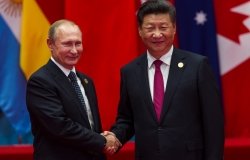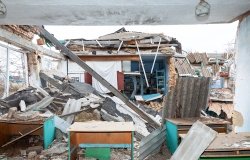
A blog of the Wilson Center
Asking Ukrainians

Shutterstock.com
94% of Ukrainians surveyed in September said Ukraine would definitely or likely win their war against Russia.
There are growing murmurs in the media that the war in Ukraine is slowly becoming a stalemate.
As the war approaches the end of its second year, two developments are important to keep in mind. First, despite the extraordinary advantages that Russians had in terms of planning, stocks of weaponry, and sheer numbers of fighters, Ukrainian forces have liberated 54% of the lands they took in the weeks after February 2022.
Second, in order to achieve this remarkable feat, Ukraine has paid an enormous price. The country’s GDP dropped more than 29% in 2022, and recent estimates are that more than 9,600 civilians have been killed by Russian attacks. Russian forces are continuing their barrage against military and civilian Ukrainian positions, and the Russian supply of weaponry—including nearly one million artillery shells from North Korea, and drones designed and built by Iran—seems inexhaustible.
And, the Ukrainian people are likely in for a few more tough months. Russia will soon train its weaponry on Ukraine’s power plants and energy infrastructure, as it did a year ago. As Foreign Minister Dmytroi Kuleba recently put it, Ukraine is “getting ready for the worst winter in history.”
But to suggest that Ukraine is facing a stalemate or failing in its mission as a few voices have implied, is to misunderstand the core of the country’s strength: its people.
In hard power terms, Ukraine has always been outmatched. The military analysis organization Global Firepower ranks Russia as the second most powerful military in the world, ahead of China. And yet, despite months of careful planning and preparation, Vladimir Putin failed to achieve the quick victory he had promised his people, and he has already lost 300,000 soldiers and 10,000 units of key military equipment.
In order to truly understand Ukraine’s war prospects, the best gauge is not so much what distant observers say—after all, they are inevitably influenced by the spin coming from both Moscow and Kyiv—but instead what everyday Ukrainians themselves believe. It’s Ukrainian families who are seeing the real costs of war, including damage to human infrastructure like schools and hospitals. They’re also the ones paying the war’s greatest price in the form of the young men and women on the front lines. Even so, their optimism hasn’t wavered.
According to a recent poll from the Center for Insights in Survey Research (CISR) at the International Republican Institute, 85% of Ukrainians surveyed say they believe the country’s future is “rather promising.” That includes 81% of respondents in the regions closest to the Russian border. Nearly 70% believe that Ukraine will “maintain all territories within its internationally recognized borders defined in 1991.” In other words, seven out of ten believe their country will regain Crimea and the Donbas and Luhansk regions currently occupied by Moscow.
What’s more, the numbers haven’t changed significantly from when CISR posed the same questions in February, nor from April of 2022 when Russia’s advantages in preparation, personnel, and weaponry were far greater than they appear today. The findings are also similar to last year’s, even after all of the death and destruction the Ukrainians have experienced in nearly two years of brutal warfare.
There’s also consistency in terms of what Ukrainians hope to see for their country. More than 80% of those surveyed say that if they could only enter one economic alliance, they would like Ukraine to join the European Union; nearly 80% say they would vote for Ukraine to join NATO.
When the Kremlin invaded Ukraine with tanks and troops, rockets and aircraft, Putin likely had dreams of seizing and holding vast tracts of Ukrainian territory. He certainly believed he could turn Ukraine away from joining NATO and the EU. It turns out that everyday Ukrainians, those on the front lines and those some distance from the pitched battles, those who have been battered, and those who face a tough winter, are a powerful force. And, with a full 94% believing they will win the war, their spirit will be tough to beat.
This blog was researched with the assistance of Caroline Moody.
About the Author












